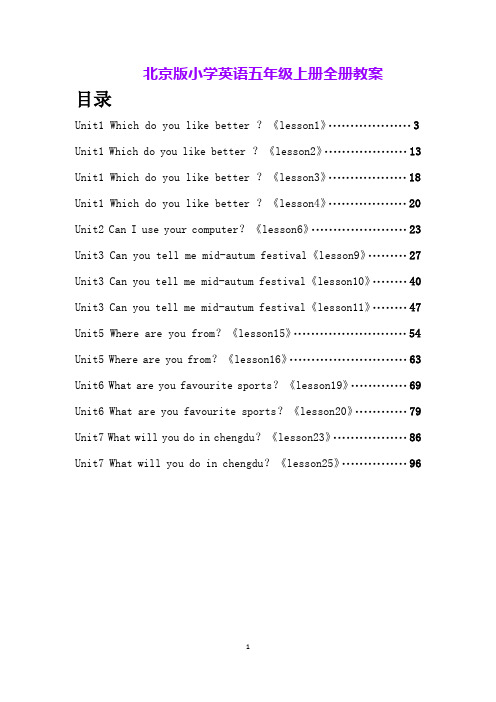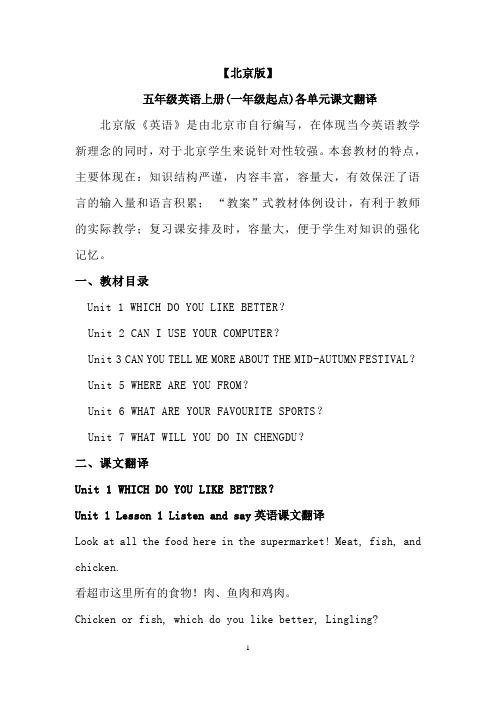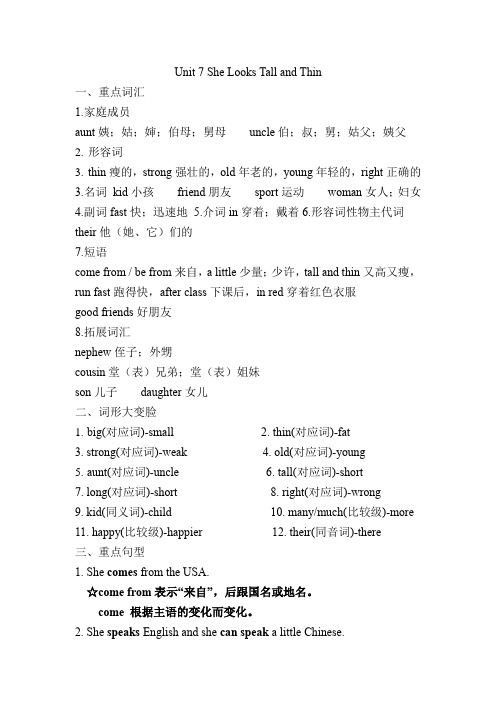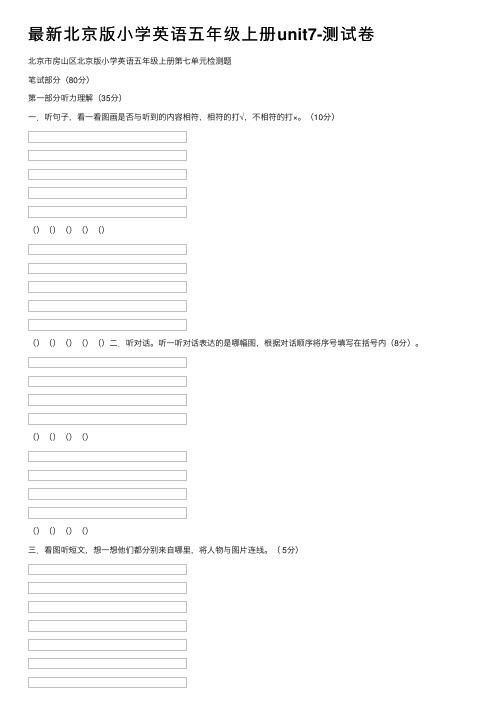北京课改版英语五年级上unit7
五年级上英语教案-Unit 7 What will you do in Chengdu Lesson 23 北京课改版

本课授课对象是我校五(1)班学生。他们在四年级上册第三单元 Will you do me a favor?下册第 6 单元 holidays 话题中接触和学习了 will 及 be going to 句型。班里有 5 名孩子的爷爷奶奶住在外地,全班同学都有节假日跟随爸爸妈妈 看望爷爷奶奶或姥姥姥爷的经历,知道给他们买礼物、食品。本班学生能够积极 参与课堂活动,勇于表达。对于表达较弱的学生老师会给与帮助和文字支持。
教学流程示意
热身环节 3’
谈话导入激活认知
呈现环节 15’ 操练环节 10’ 产出环节 10’
描述图片梳理问题 观看动画初步感知 深入讲解渗透德育
听音指读关注文字 复述故事梳理脉络 游戏操练巩固句型 联系生活实际应用
作业布置 2’
完成写作深化德育 相关资源
本课都江堰简介参考了网上四川都江堰的视频材料,选取了学生能理解和明白的 简单词汇进行介绍。内容如下: Du-jing-yan is in Sichuan in China. It built in 2 hundred56 BC by Li Bing and his son. It has been benefiting the human race over 2250 years. It’s very important and useful for Chengdu. It’s very beautiful. The water is blue. The hills are green. Du-jiang-yan is the world heritage. 网络地址 /show/9pCCALtE6ftlgMre.html。 内容简介:简单介绍了都江堰的地理位置,建造的时间,历经的时间,建造的人, 它的作用和成就以及现在的景色等内容,引发学生对祖国山河的了解与热爱,从 而自觉形成对环境保护的意识。
北京版英语五年级上册第七单元

五年级上册第七单元词汇分类:交通工具:train火车,plane飞机,car汽车,subway地铁,bus公交车,taxi出租车,bike自行车旅游地点:Chengdu成都(属于成都),the Bird's Nest鸟巢,the Summer Palace颐和园,Du-Jiang-Yand都江堰(in Si Chuan),Mount Tai泰山(in Shan Dong),the Mogao Caves莫高窟(in Gansu),the Potala Palace布达拉宫(in Tibet)动词短语:get up起床,have breakfast吃早饭,have lunch吃午饭,have dinner吃晚饭,leave离开,leave for the museum去博物馆,leave for the show去看表演,visit the palace参观宫殿,meet at the gate在大门口见面,get back to the hotel回到酒店重点句型:1、Why do you look so excited?你为什么看起来那么兴奋?Because my parents and I are going to Chengdu.因为我和我的父母一起要去成都2、Are you going there by train?你们要坐火车去吗?No,we are going by plane.It’s fast.不,我们要坐飞机去,会快一些3、What will you do in Chengdu?你要在成都干什么?We'll visit my grandparents. We’ll see the pandas.我们要拜访我的爷爷奶奶,我们还要去看熊猫。
4、Don't forget to see Du-Jiang-Yan.不要忘记去看都江堰5、What would you like to drink?你想喝些什么?I’d like some apple juice我想喝一些苹果汁6、Are you travelling alone?你是独自旅行吗?Yes,my cousin will pick me up in Chengdu是的,我表哥会在成都接我7、Are we going to see the pandas tomorrow?我们明天是要去看熊猫吗?Yes,I’ll drive you there, I’m a good driver.是的,我会开车带你们去那里,我可是一个好司机8、What time are we going to leave?我们打算什么时间离开呢?We are going to leave early at 7:30 after breakfast.我们吃完早饭7:30一早就离开9、We will come back for dinner.我们会回来吃晚饭的。
北京课改版五年级上册小学英语 Unit 7 单元知识点小结

Unit 7 What will you do in Chengdu?一、核心词汇1.名词:panda熊猫cousin堂兄弟姊妹;表兄弟姊妹driver驾驶员breakfast早餐dinner晚餐;正餐2.动词:forget忘记3.形容词:fast快速的brave勇敢的tall高的busy忙碌的4.副词:early早二、了解词汇1.交通工具名词:train火车plane飞机car小汽车subway地铁bus公共汽车taxi出租汽车2.景点名词:Du-jiang-yan都江堰the Bird’s Nest鸟巢the Summer Palace颐和园Mount Tai泰山the Mogao Caves莫高窟the Potala Palace布达拉宫Taipei 101台北101大楼the Sun Moon Lake日月潭Ali Mountain阿里山3.名词:uncle叔叔lunch午餐cinema电影院4.动词:travel旅行visit参观;看望see看pick …up接……leave for动身去meet见面getup起床have breakfast吃早餐have lunch吃午餐have dinner吃晚餐get back返回三、核心句型1.— Are you going there by train?你们打算乘火车去那儿吗?— No, we are going by plane.不,我们打算乘飞机去。
解读:询问某人怎样去某地的句型及答语。
“be going to + 动词原形”是一般将来时的一种表达方式,表示“计划、打算做某事”。
举一反三:— Are you going to the cinema by bike?你打算骑自行车去电影院吗?— No. I’m going on foot. 不。
我打算步行去。
— Are you going to the supermarket by taxi?你们打算乘出租车去超市吗?— No. We are going by bus. 不。
北京版小学英语五年级上册全册教案

北京版小学英语五年级上册全册教案目录Unit1 Which do you like better ?《lesson1》 (3)Unit1 Which do you like better ?《lesson2》 (13)Unit1 Which do you like better ?《lesson3》 (18)Unit1 Which do you like better ?《lesson4》 (20)Unit2 Can I use your computer?《lesson6》 (23)Unit3 Can you tell me mid-autum festival《lesson9》 (27)Unit3 Can you tell me mid-autum festival《lesson10》 (40)Unit3 Can you tell me mid-autum festival《lesson11》 (47)Unit5 Where are you from?《lesson15》 (54)Unit5 Where are you from?《lesson16》 (63)Unit6 What are you favourite sports?《lesson19》 (69)Unit6 What are you favourite sports?《lesson20》 (79)Unit7 What will you do in chengdu?《lesson23》 (86)Unit7 What will you do in chengdu?《lesson25》 (96)Unit1 Which do you like better ?《lesson1》1教学目标1.能够听懂并朗读listen and say 中的对话内容并能运用“Whichdo you like better?I like....better.的交际用语询问并回答更喜欢哪种食物和饮料。
北京版-英语-五年级上册-Unit 7 What will you do in Chengdu Lesson 23 教学设计

2.能够运用be going to结构询问及表达打算去哪旅行及旅行时乘坐交通工具的句型:Are you going to…? No, I’m going to…. Are you going by…? No, we’re going by….3.了解四川著名风景、饮食和文化,并对其产生兴趣。
五、教学难点能够使用新语言进行实际交流和表达。
六、相关资源视频:四川文化内容简介:该视频是关于四川文化的宣传片,介绍了四川的自然风光、人文景观、特色美食、国宝熊猫,让学生对四川有了大体了解,产生喜爱四川、热爱祖国大好河山的感情。
图片:百度网搜集内容简介:卡通版关窗、做作业、爷爷奶奶(老人)图片,非常形象,符合学生年龄特点。
更主要的是,图文结合有利于学生理解,让学生树立做作业、抽空看望爷爷奶奶的意识,弘扬中华民族关于“孝”的传统美德。
教学过程(英文描述为主)I.Warming up1.Free talk.T: What day is today?S1: Today is Friday.T: What day is tomorrow?S2: Tomorrow is Saturday.II.Presentation1.T:出示PPT,边播放边说:T: I love Saturday. I’m going to the Summer Palace. I’mgoing to see Duobaoliulita. I’m going to row the boat. I’m goingto climb Wanshoushan.3.学生根据教师的描述回答问题:T: What are you going to do this Saturday?S: I’m going to….【设计意图】上课伊始与学生自由谈话,唤起学生已知,引出本节课出游主题。
在谈到“I love Saturday.”时,教师一边播放PPT,一边介绍周六的郊游计划。
【北京版】五年级英语上册(一年级起点)各单元课文翻译

【北京版】五年级英语上册(一年级起点)各单元课文翻译北京版《英语》是由北京市自行编写,在体现当今英语教学新理念的同时,对于北京学生来说针对性较强。
本套教材的特点,主要体现在:知识结构严谨,内容丰富,容量大,有效保汪了语言的输入量和语言积累;“教案”式教材体例设计,有利于教师的实际教学;复习课安排及时,容量大,便于学生对知识的强化记忆。
一、教材目录Unit 1 WHICH DO YOU LIKE BETTER?Unit 2 CAN I USE YOUR COMPUTER?Unit 3 CAN YOU TELL ME MORE ABOUT THE MID-AUTUMN FESTIVAL? Unit 5 WHERE ARE YOU FROM?Unit 6 WHAT ARE YOUR FAVOURITE SPORTS?Unit 7 WHAT WILL YOU DO IN CHENGDU?二、课文翻译Unit 1 WHICH DO YOU LIKE BETTER?Unit 1 Lesson 1 Listen and say英语课文翻译Look at all the food here in the supermarket! Meat, fish, and chicken.看超市这里所有的食物!肉、鱼肉和鸡肉。
Chicken or fish, which do you like better, Lingling?鸡肉和鱼肉,你更喜欢哪一个,玲玲?I like fish better. It’s yummy.我更喜欢鱼肉。
它很好吃。
Meat is my favourite. I like chicken, too.肉是我最喜欢的。
我也喜欢鸡肉。
Here’s a b ottle of juice for you.这是给你的一瓶果汁。
No, thank you. I like water better.不,谢谢你。
部编版五年级上册英语第七单元知识总结-Unit 7知识点总结

Unit 7 She Looks Tall and Thin一、重点词汇1.家庭成员aunt姨;姑;婶;伯母;舅母uncle伯;叔;舅;姑父;姨父2.形容词3.thin瘦的,strong强壮的,old年老的,young年轻的,right正确的3.名词kid小孩friend朋友sport运动woman女人;妇女4.副词fast快;迅速地5.介词in穿着;戴着6.形容词性物主代词their他(她、它)们的7.短语come from / be from来自,a little少量;少许,tall and thin又高又瘦,run fast跑得快,after class下课后,in red穿着红色衣服good friends好朋友8.拓展词汇nephew侄子;外甥cousin堂(表)兄弟;堂(表)姐妹son儿子daughter女儿二、词形大变脸1.big(对应词)-small2. thin(对应词)-fat3. strong(对应词)-weak4. old(对应词)-young5.aunt(对应词)-uncle6. tall(对应词)-short7. long(对应词)-short 8. right(对应词)-wrong9. kid(同义词)-child 10. many/much(比较级)-more11. happy(比较级)-happier 12. their(同音词)-there三、重点句型1. She comes from the USA.☆come from表示“来自”,后跟国名或地名。
come 根据主语的变化而变化。
2. She speaks English and she can speak a little Chinese.☆speak表示“说”,后跟表示语言的名词时,意为“说某种语言”。
2.She can run very fast.3.We are good friends.4.The young man beside her is my uncle.5.Who is the young woman in red? “who”问“人”6.She looks very beautiful in the red dress.☆look表示“看起来”,in后面接表示颜色的名词,意为“穿着某种颜色的衣服”。
北京版英语五年级上册第七单元听力资料

北京版英语五年级上册第七单元听力资料Listening Passage:Welcome to our seventh unit of the Beijing Edition English textbook for Grade 5! Today, we're going to explore the fascinating world of our school life. Listen carefully as we delve into the various aspects that make up this integral part of our daily routine.(1) School Routine:Our day begins with the melodious sound of the school bell ringing at 8:00 am, signaling the start of another exciting day at school. We line up in an orderly manner, ready to participate in the morning assembly. Here, our principal delivers inspiring messages and updates about upcoming events. Afterward, it's time for our first class, which could be anything from Mathematics to English or Chinese.(2) Classes and Subjects:Throughout the day, we attend a variety of classes, each designed to nurture different skills and knowledge. In Science class, we conduct experiments and learn aboutthe wonders of the natural world. During Art lessons, we unleash our creativity, painting vibrant landscapes or molding clay sculptures. Physical Education classes keep us active and teach the importance of fitness and teamwork.(3) Break Time:The highlight of our school day is undoubtedly recess. It's a time for laughter, games, and socializing with friends. The playground transforms into a bustling hub of activity – some students play basketball, others jump rope, while a few enjoy a quiet chat under the shade of a tree. Recess reenergizes us for the remaining classes and strengthens our bonds with classmates.(4) Extracurricular Activities:After school hours, our campus comes alive with a myriad of extracurricular activities. Some of us join the Debate Club to hone our public speaking skills, while others enroll in the Robotics Club to explore the realm of technology. The Music Room resonates with the harmonies of the Choir, and the Dance Studio witnesses graceful moves of the Dance Troupe. These activities not only broaden our horizons but also foster a sense of belonging and accomplishment.(5) Teachers and Friends:At the heart of our school life are our dedicated teachers who tirelessly guide and support us. They patiently clarify concepts, encourage us to think critically, and inspire us to strive for excellence. Equally important are our friends, who share our joys, challenges, and aspirations. Together, we learn the values of cooperation, empathy, and resilience, forming lifelong friendships that transcend the classroom walls.In conclusion, our school life is a vibrant tapestry woven with academic pursuits, recreational activities, and meaningful relationships. It is here where we grow, learn, and evolve, laying the foundation for our future endeavors. As we continue our journey through this unit, let's embrace every aspect of our school life with enthusiasm and gratitude, cherishing the invaluable experiences and lessons it offers.[End of Listening Passage]This passage provides a comprehensive overview of school life, encompassing routines, classes, break times, extracurricular activities, and the roles of teachers and friends. It meets the specified word count (139-200 words)and offers a multi-dimensional perspective on the topic, aligning with the requirement for a high-quality, in-depth analysis.。
五年级上册英语教案Unit7lesson25北京版

教案五年级上册英语教案 Unit 7 lesson 25 北京版教学内容:本课为北京版五年级上册英语第七单元第二十五课。
教学内容包括学习英语名词的复数形式,以及如何使用它们来表达数量。
学生将通过各种有趣的活动和练习,掌握名词复数的用法,并能够运用到实际情景中。
教学目标:1. 学生能够理解名词复数的概念,并能够正确地变化名词为复数形式。
2. 学生能够运用名词复数来表达数量,并能进行简单的计算。
3. 学生能够通过听力练习,理解并运用名词复数的用法。
4. 学生能够通过口语练习,正确地使用名词复数进行交流。
教学难点:1. 名词复数的构成规则,特别是不规则变化的名词。
2. 学生在口语表达时,能够准确地使用名词复数。
教具学具准备:1. 英语教材2. 多媒体设备3. 名词复数卡片4. 练习题教学过程:1. 导入:通过图片或实物展示,引导学生回顾已学的名词,并引入名词复数的概念。
2. 新课内容:讲解名词复数的构成规则,特别是不规则变化的名词。
通过示例和练习,让学生理解和掌握名词复数的用法。
3. 练习:进行听力练习,让学生听懂并能够运用名词复数。
再进行口语练习,让学生正确地使用名词复数进行交流。
4. 活动设计:设计一些有趣的活动,如“猜猜看”游戏,让学生在游戏中运用名词复数,增加学习的趣味性。
板书设计:1. 五年级上册英语教案 Unit 7 lesson 25 北京版2. 名词复数的概念和构成规则3. 名词复数的用法4. 练习和活动设计作业设计:1. 听力练习:听懂并能够运用名词复数。
2. 口语练习:正确地使用名词复数进行交流。
3. 书面练习:完成练习题,巩固名词复数的用法。
课后反思:本节课通过讲解、练习和活动,让学生掌握了名词复数的用法。
在教学过程中,要注意引导学生理解名词复数的概念,并能够正确地变化名词为复数形式。
同时,要加强口语练习,让学生在实际交流中能够准确使用名词复数。
通过本节课的学习,学生能够更好地理解和运用名词复数,提高英语学习的水平。
北京版英语5年级上册北京课改五上 Unit 7 测试卷

UNIT WHAT WILL YOU DO IN 原创不容易,为有更多动力,请【关注、关注、关注】,谢谢!新竹高于旧竹枝,全凭老干为扶持。
出自郑燮的《新竹》汪村中心小学钱少华CHENGDU?满分:100分时间:60分钟得分:听力部分一、听录音,选出单词。
(10分)( )1.A. sheep B. bears C. pandas( )2.A. eat B. drink C. do( )3.A. brave B. busy C. tall ( )4.A. dive B. drive C. driver ( )5.A. breakfast B. lunch C. dinner二、听录音,给下列图片排序。
(10分)三、听录音,给下列句子排序。
(10分)( )It is fast to go by plane.( )They will have a busy day.( )They will go to see the pandas, too.( )Lingling and her parents are going to visit her grandparents in Chengdu.( )Her uncle is going to take them to Du-jiang-yan.笔试部分四、给下列句子选择相应的答语。
(10分)( )1.Why do you look so excited? A. No. By plane.( )2.Are you going there by train? B. We’ll visit Du-jiang-yan.( )3.What will you do in Chengdu? C. Because we are going to Chengdu.( )4.What would you like to drink? D. t 7:30 after breakfast.( )5.What time are we going o leave? E. Orange juice, please.五、选择正确的答案。
最新北京版小学英语五年级上册unit7-测试卷

最新北京版⼩学英语五年级上册unit7-测试卷北京市房⼭区北京版⼩学英语五年级上册第七单元检测题笔试部分(80分)第⼀部分听⼒理解(35分)⼀.听句⼦,看⼀看图画是否与听到的内容相符,相符的打√,不相符的打×。
(10分)()()()()()()()()()()⼆.听对话。
听⼀听对话表达的是哪幅图,根据对话顺序将序号填写在括号内(8分)。
()()()()()()()()三.看图听短⽂,想⼀想他们都分别来⾃哪⾥,将⼈物与图⽚连线。
( 5分)四.听对话,想⼀想对话中的⼈物谈论了什么事情,根据问句选择相应答语,将标号填写在括号内。
( 4分)听第⼀段对话,回答第1、2题:() 1.Where are you going this summer vacation?A. ShanghaiB.BeijingC.Hangzhou() 2. Are you going to Beijing by train?A.by busB. by carC.by plane听第⼆段对话,回答第3、4题:() 3.What will you do in Beijing?A. visit Beijing ZooB. the Great Wall C: Tian’an men Square()4. What time are you going to leave?A. After a weekB. tomorrowC. At 7:30五.根据短⽂内容,在表格内填⼊单词或者词组.(8分)Name HowAge What _____ VancouverWhere Canada六.第⼆部分语⾔知识(30分)Lily六.读词或词组看图,选择与图意相符的,将其标号填写在横线上。
(5分)七.读每组单词,根据每组单词的类别,在横线上写两个同类词。
(5分)1.subway plane ship2. Canada Russia The U.S.A3. visit play see4. to by as5.apple orange peach⼋.读句⼦,从每题所给的三个选项中选择⼀个最恰当的填⼊空⽩处。
- 1、下载文档前请自行甄别文档内容的完整性,平台不提供额外的编辑、内容补充、找答案等附加服务。
- 2、"仅部分预览"的文档,不可在线预览部分如存在完整性等问题,可反馈申请退款(可完整预览的文档不适用该条件!)。
- 3、如文档侵犯您的权益,请联系客服反馈,我们会尽快为您处理(人工客服工作时间:9:00-18:30)。
Yes, I'll drive you there. I'm a good driver.
What time are we going to leave?
We are going to leave early at 7:30 after
breakfast.
early早的 late 晚的
Are you going to Du-jiang-yan,too? Yes, in the afternoon. We'll have a busy day. We will come back for dinner, Grandma. Have a nice day! come back回来
• You are really
.What will you do in
Chengdu? brave勇敢的
• I will visit Du-jiang-yan.I want to see the
pandas,too.
6:30 get up
7:00
7:30
have breakfast leave
8:30 visit the palace
We are going to leave at 7:30
两者之间作比较, 用比较级。形容 词后面加er.
Nice to see you all again. You're taller, Lingling.
Thank you, Uncle! Are we going to see the pandas tomorrow?
What will you do in Gansu?
Gansu
the Mogao Caves
What will you do in Tibet?
Tibet
the Potala Palace
train
car
bus
plane
subway
taxi
excited兴奋的(修饰人) exciting令人兴奋的(修饰物)
some apple juice,please.
I'd like=I woulld like
alone travel alone
brave
pick up
travel旅行 alone独自
cousin表堂兄弟姐妹 pick up捡起,开车接送
• Are you
?
• Yes. My
will
in Chengdu.
12:00 meet at the gate
12:30
13:30
17:30
have lunch leave for the museum have dinner
18:30 leave for the show
21;30
get back to hotel
What time are we going to leave?
• Don't forget to see Du-jiang-yan.
• No, we won't.
forget 想要.....
• What
drink?
• Orange juice,please.
• How about you,young man?
luck运气 good luck祝你好运
lucky幸运的 lucky dog幸运儿
一般将来时:将来,未来,以后发生的事情 动词:will+动词原形 否定:will not(won't) 疑问句:will提前。
• What you do in Chengdu?
visit my grandparents. We'll see the pandas.
What will you do in Chengdu?
Chengdu
Du-jiang-yan
What will you do in Beijing?
the Bird's Nest
the Summer Palace
What will you do in Shandong?
Shandong
Mount Tai
• Why do you look so
.Lingling?
• Because my
and I are going to
Chengdu. parents=father and mother
• Lucky you !Are you going there by train?
• No, we are going by plane.It's fast.
